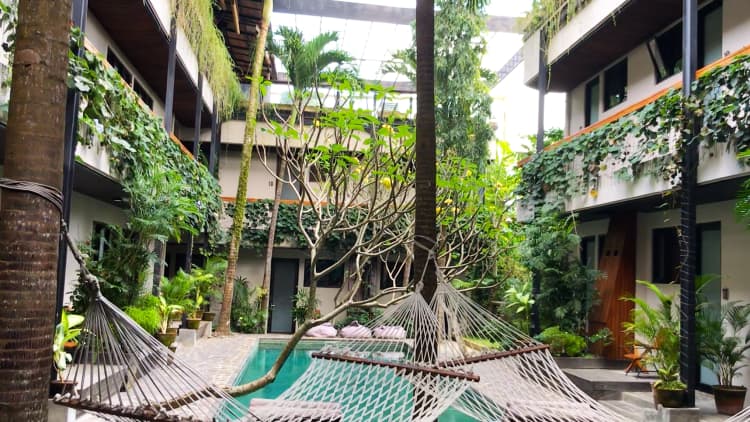It's 2 p.m. on a Saturday afternoon, and Matt Alcock is in tourism hotspot Bali.
But instead of lounging by the pool or sightseeing at one of the Indonesian island's temples, he's sitting at the rooftop space, working hard on the design of a name card for a cafe in Vietnam.
Alcock is a digital nomad staying with Roam, a co-living start-up that brings together a community of people who live near each other and share communal spaces such as kitchens and work areas.
The product designer, who is on a year-long sabbatical, said he considered traveling for a year as a tourist, but thought he would be more fulfilled working on pet projects and meeting people who are in the creative and technology space.
Alcock is part of a growing group of people which co-living companies are targeting. As more jobs become dependent on technology, working remotely has become more common.
A Gallup poll showed that 24 percent of people surveyed in the United States spent more than 80 percent of their time working remotely in 2012. That grew to 31 percent by 2016.
The idea of co-living has been around for a while. But it is increasingly becoming an area attracting deep-pocketed investors, even as companies experiment with the format to attract customers in different markets.
Office-sharing titan WeWork, the largest private occupier of office space in London, opened two locations under the shared-living brand WeLive in the United States. Its apartments in New York City range from studios to four-bedroom units, and typically cost less than similar buildings in the neighborhood.
In Asia, real estate titan CapitaLand launched its co-living brand lyf, which it is currently developing in China, Singapore, Thailand and the Philippines. Its first lyf property in Shenzhen is scheduled to open early this year.
Singapore-based start-up Hmlet manages co-living spaces in expensive cities like Hong Kong and Singapore, and has thrown in perks for residents by organizing community events like cocktail-making classes.
Roam, which has raised $3.4 million in seed funding, is poised to open more locations this year in New York City and London. It already has spaces operating in Miami, San Francisco and Tokyo.
The start-up requires newcomers to stay for at least a week for their first visit, but said that most of their members tend to stay for about three weeks.
About 15 percent of their members also joined their flex program, a loyalty scheme that helps participants get priority bookings and better prices.
A Roam spokesperson told CNBC they are not concerned about targeting demographics or the "proverbial late-twenties marketing freelancer."
"We don't have any age limit or preference as it goes against what we believe. At Roam, we think that the proper definition for community is a rich mix of people coming together for a diverse range of experiences."
"We have all sorts (of people) living at Roam, from 32-year-old racecar drivers to 72-year-old retired explorers."
Aaron Bryson, an American cybersecurity consultant who has been traveling the world for more than a year, stayed at Roam in the Balinese town of Ubud for a month. Having stayed in Airbnbs, hotels and hostels, he said he sees co-living as becoming more popular than co-working.
While co-working may not be a staple for digital nomads because "many can just work out of a cafe," co-living has more potential to catch on if the providers get the culture and amenities, such as good internet connection, right, he said.
Meanwhile, Alcock joked that he probably shouldn't have just bought a couple of long-term stays at Roam without trying it out first.
But nine months into his global sabbatical travel trip, and staying in different forms of shared working and accommodation spaces, he said he has learned more about what he needs from a conventional office as well as his own working preferences.
"Those skills are going to be invaluable for the next ten years," he said.



